Cale explains the shockingly powerful message of the Gospel of Mark, a truly revolutionary document that changed the world. For more on this topic, see this post.
Posts
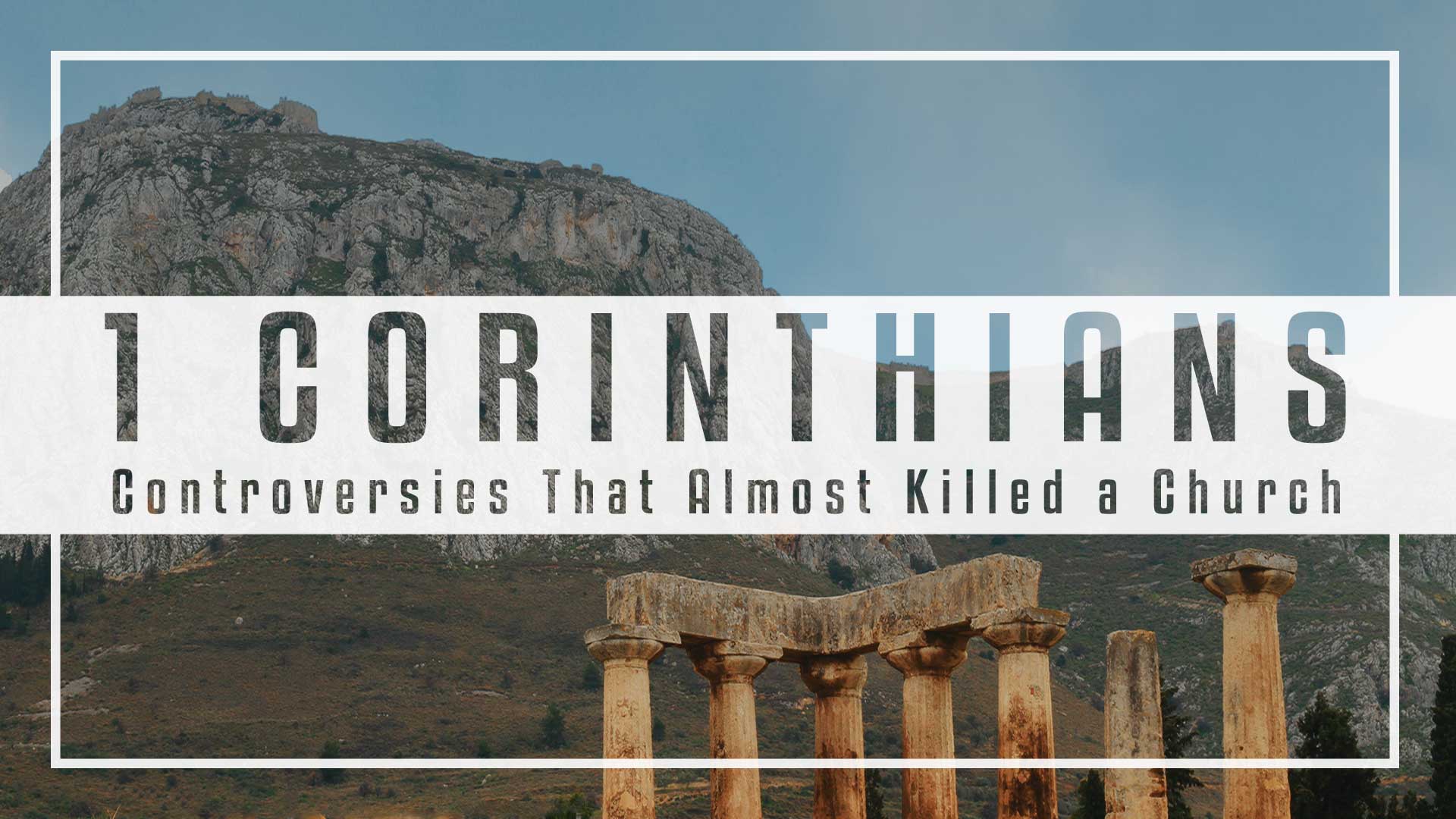
Once again, this Sunday’s second reading is from 1 Corinthians, and once again it’s from chapter 1 (vv. 10-13, 17). There were real divisions in the congregation that were very worrying to St Paul. Peter Kreeft once noted that Paul was horrified by the beginnings of a sort of “Protestantism” in Corinth. It isn’t a bad analogy at all – many early Protestant movements came to be identified with the particular individual who founded it – Lutheranism (Martin Luther) and Calvinism (John Calvin) are two examples that immediately spring to mind.
In Corinth in the first century, members of the Church were aligning themselves behind various leaders, too. They weren’t leaving the Church per se in order to do that, but these actions still had a very divisive effect. Catholics were forming various “camps” based on which leader they preferred, whether that was Paul, Apollos (a very eloquent preacher in the early Church who had spent some time in Corinth – for more on him see Acts 18:24-28), or Cephas (the Apostle Peter – “Cephas” is “Peter” in Aramaic). Some seemed to reject any merely human leadership, claiming to belong solely to Jesus Christ, without need of any Church intermediaries.
Some representatives of a “parishioner” in Corinth (“Chloe’s people”) had gotten word about this state of affairs to Paul, who at the time was in Ephesus. He was incredulous and extremely disappointed. He thunders, “Is Christ divided? Was Paul crucified for you? Or were you baptized in the name of Paul?” He urges them in the strongest words possible (“in the name of our Lord Jesus Christ”) “that all of you agree in what you say, and that there be no divisions among you, but that you be united in the same mind and in the same purpose.” Christ must be the centre, and human leaders are only useful inasmuch as they point people not to themselves, but to Jesus.
How can we apply Paul’s warning to us today?
Today, just as in the first century, Catholics are just as tempted to create “cults of personality” centred around human leaders, whether they be bishops, priests, professed religious, or laypeople. There are also people who foolishly believe that they can have full access to Jesus without the Church. How do we deal with such problems? I would suggest two remedies – one for all of us, and one for those in leadership.
First, for all Catholics – we must recognize that the basis of our belief is the one Person of Christ. This is what unites us: “one Lord, one faith, one baptism”, as Paul writes elsewhere (Ephesians 4:3-5). Secondly, leaders must purify their intentions. Why do we do what we do? Is our intention solely to give glory to God, or to ourselves? Humans are always a “mixed bag” of motives to some extent, but our neither our motives nor our message should revolve around ourselves. Paul himself sets the example, as he notes in today’s reading: Christ sent him to “preach the gospel, and not with the wisdom of human eloquence, so that the cross of Christ might not be emptied of its meaning.”
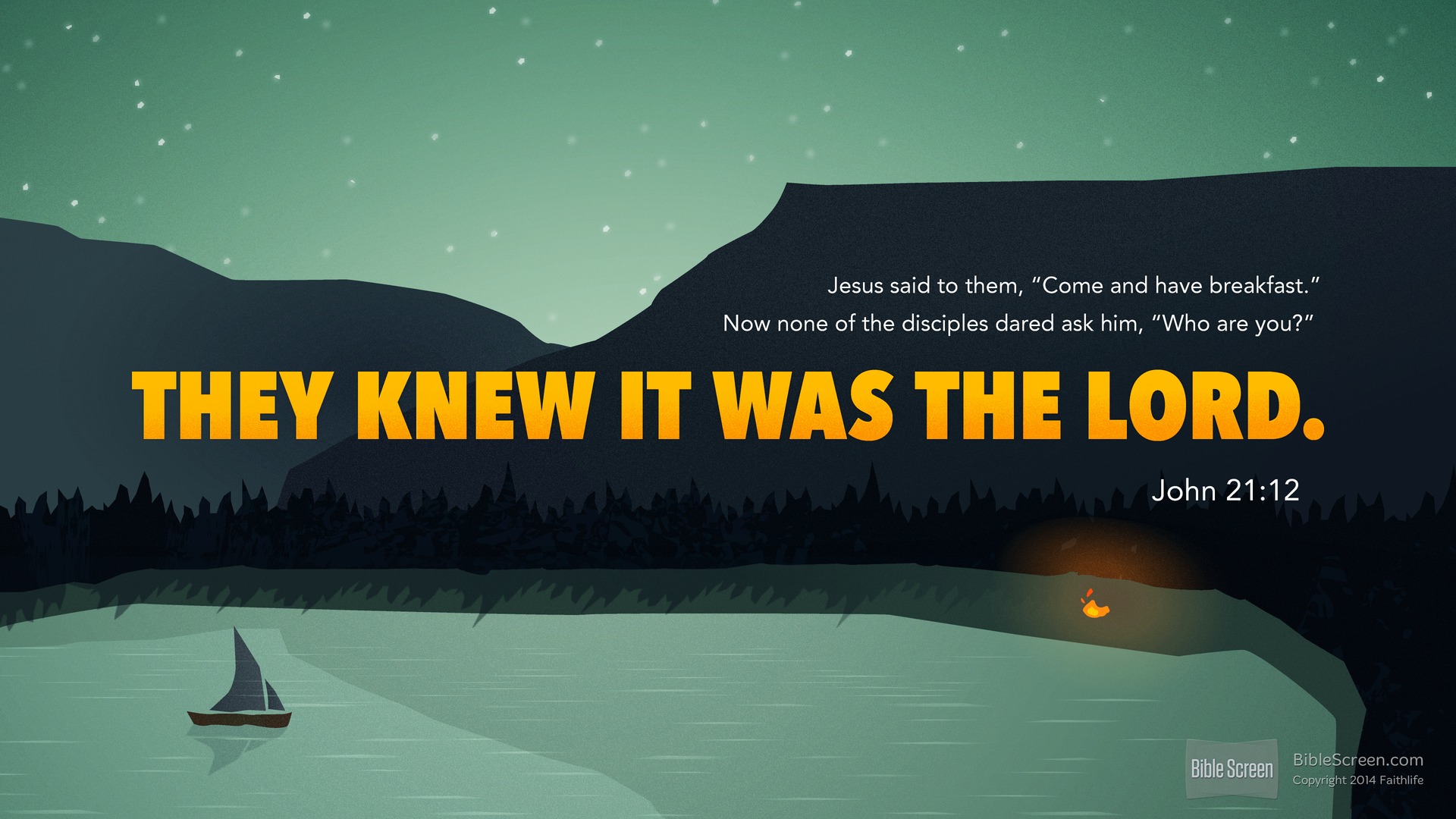
Q. This Sunday’s Gospel is taken from John 21. Does this chapter have any implications for the papacy?
A. Other texts, like Matthew 16, are often cited in this regard, but John 21 has one of the strongest proofs for the ongoing role of the office of Peter in the universal Church. Even non-Catholic scholars recognize this.
Q. Does the miraculous catch of fish in this chapter have anything to do with the Petrine office?
A. Fishing, of course, wasn’t just the former trade of the apostles; it represents their evangelistic mission of being “fishers of men”. The unbroken net conveys the unity of the one Catholic (universal) Church. Elsewhere, when Jesus provides a miraculous draught of fish, the nets begin to break from the strain; here, the nets are intact. Peter, dragging the net ashore, evokes his leadership in bringing the Church safely home to Christ, even to the shores of Heaven itself.
Interestingly, although the catch was so big that the disciples struggled to bring the nets aboard, almost sinking their boat, Peter now easily drags the net ashore all by himself. The Greek verb in the original text that is used to describe Peter’s dragging of the net is the same one used by Jesus in John 12:32. This is where Jesus says that, as he is lifted up from the earth, he will draw all people to himself.
Q. Why does the text mention specifically that 153 fish were caught?
A. By far, the most puzzling aspect of the passage is the reference to the 153 fish. First of all, this is an authentic eyewitness detail. On a secondary level, many commentators have proffered various theories to explain what this number might symbolize (John’s Gospel functions on “two levels” – there is often a secondary, “heavenly” meaning to earthly events). Most of these interpretations suggest the idea of the universality or completeness of the catch.
So, to sum up: we have Peter, alone, dragging the unbroken net of a universal catch to the shores of heaven. This is clearly a reference to his position as leader of the Church on earth.
When you add to all of this the threefold charge of Jesus to Peter (“Feed my Sheep”) that immediately follows, the picture is complete. Peter is singularly (in the original Greek text) given this responsibility to shepherd the universal Church. Keep in mind also that this event is recounted in the same Gospel in which Jesus describes himself as the “Good Shepherd” (John 10). Before his Ascension, Jesus here reaffirms Peter’s unique leadership position, passing the earthly reins of the Church to him.
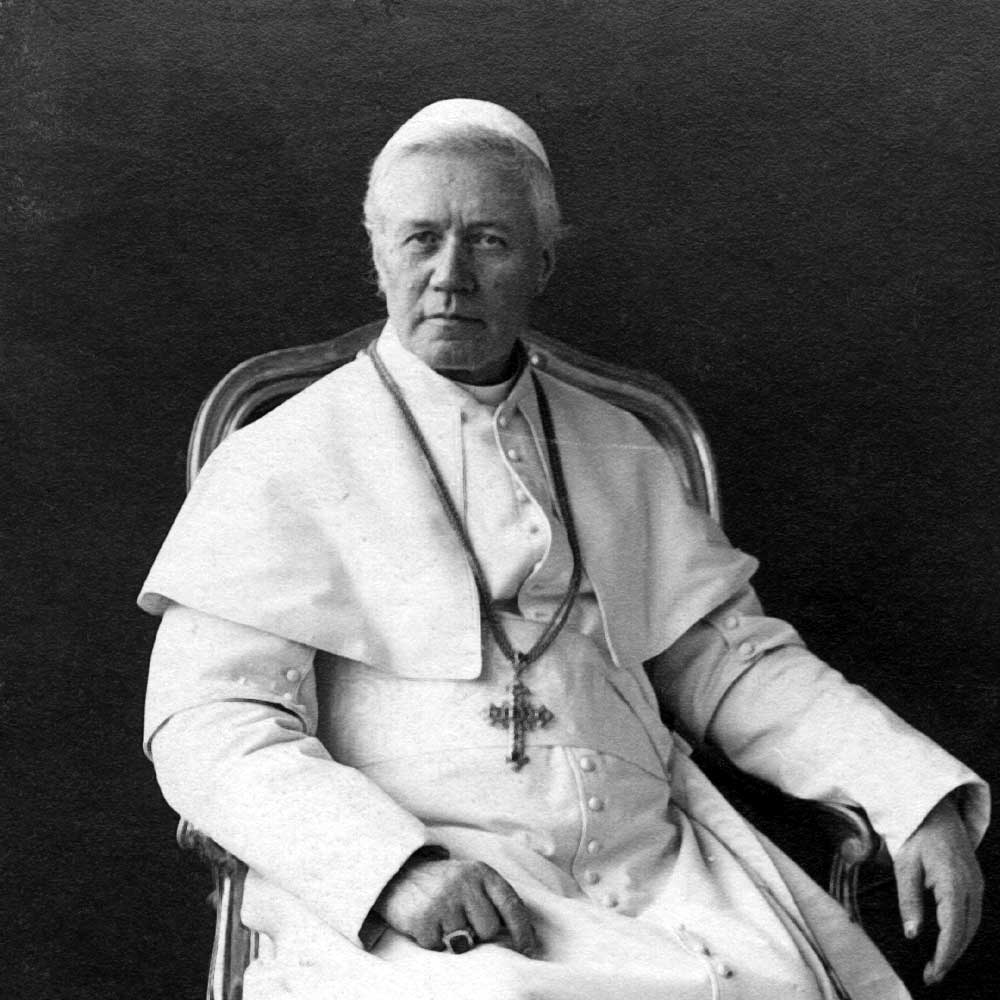 Today marks the feast day of Pope St Pius X, who occupied the See of Peter from 1903-1914. One of St Pius’ great reforms was to lower the age of first communicants to the age of reason (usually considered to be around eight years old). As long as a child believed that the Eucharist was the Body, Blood, Soul, and Divinity of Jesus Christ – hidden under the appearances of bread and wine, that child could receive communion. This is a great thing, because it reminds us that we can be sure a doctrine is true, without necessarily having complete and total understanding of it.
Today marks the feast day of Pope St Pius X, who occupied the See of Peter from 1903-1914. One of St Pius’ great reforms was to lower the age of first communicants to the age of reason (usually considered to be around eight years old). As long as a child believed that the Eucharist was the Body, Blood, Soul, and Divinity of Jesus Christ – hidden under the appearances of bread and wine, that child could receive communion. This is a great thing, because it reminds us that we can be sure a doctrine is true, without necessarily having complete and total understanding of it.
For example, no one, not even the greatest theologian, completely understands the doctrine of the Trinity. And anyone who says they do is mistaken, for no one has complete understanding of the uncreated, three-in-one Godhead crammed inside one’s feeble, created mind. Yet, every Catholic can be sure it is true that God is a Trinity of Persons, because it has been divinely revealed. In the same way, I believe and know that electricity works. I have certitude about it, even though I’m not a professional electrician and can’t explain the circuitry and currents involved. For me to benefit from it, I simply need to make an act of faith in what I know to be true – by turning on the light.
One of the reasons I left the Catholic Church as a twentysomething university student was that I could never get a satisfying answer from the Catholics I knew about why certain doctrines were true. I thought this was evidence of the weakness of the faith. In reality, I was, of course, making an elementary error in thinking that, simply because a religious adherent couldn’t explain a tenet of their faith, it therefore follows that it is not true.
Although we should, as the original Pope, St Peter, encourages us, “make every effort to add to (our) faith…knowledge” (2 Peter 1:5), one can still have certitude about these things, even if we don’t have perfect knowledge of them. Why? Because we have a divinely authorized Church to teach them to us – and we need this. If each of us had to reason our own way to saving knowledge of God by ourselves, we’d be in trouble, easily led astray. God foreknew this, providing us with a Church that would be Mater et Magistra (Mother and Teacher), safeguarding Jesus’ teachings until the end of time. We thank our Lord for this today, and for providing his Church with great spiritual fathers like St Pius X.
What do you think? Share this post on Facebook, Twitter, and LinkedIn.
You may also like: Pope Pius X and the Immaculate Conception
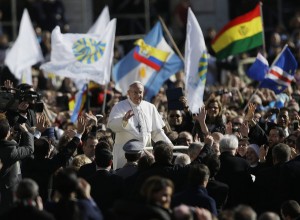
HOMILY OF POPE FRANCIS
INAUGURATION OF THE PETRINE MINISTRY
ST PETER’S SQUARE
19 MARCH 2013
Dear Brothers and Sisters,
I thank the Lord that I can celebrate this Holy Mass for the inauguration of my Petrine ministry on the solemnity of Saint Joseph, the spouse of the Virgin Mary and the patron of the universal Church. It is a significant coincidence, and it is also the name-day of my venerable predecessor: we are close to him with our prayers, full of affection and gratitude.
I offer a warm greeting to my brother cardinals and bishops, the priests, deacons, men and women religious, and all the lay faithful. I thank the representatives of the other Churches and ecclesial Communities, as well as the representatives of the Jewish community and the other religious communities, for their presence. My cordial greetings go to the Heads of State and Government, the members of the official Delegations from many countries throughout the world, and the Diplomatic Corps.
In the Gospel we heard that “Joseph did as the angel of the Lord commanded him and took Mary as his wife” (Mt 1:24). These words already point to the mission which God entrusts to Joseph: he is to be the custos, the protector. The protector of whom? Of Mary and Jesus; but this protection is then extended to the Church, as Blessed John Paul II pointed out: “Just as Saint Joseph took loving care of Mary and gladly dedicated himself to Jesus Christ’s upbringing, he likewise watches over and protects Christ’s Mystical Body, the Church, of which the Virgin Mary is the exemplar and model” (Redemptoris Custos, 1).
How does Joseph exercise his role as protector? Discreetly, humbly and silently, but with an unfailing presence and utter fidelity, even when he finds it hard to understand. From the time of his betrothal to Mary until the finding of the twelve-year-old Jesus in the Temple of Jerusalem, he is there at every moment with loving care. As the spouse of Mary, he is at her side in good times and bad, on the journey to Bethlehem for the census and in the anxious and joyful hours when she gave birth; amid the drama of the flight into Egypt and during the frantic search for their child in the Temple; and later in the day-to-day life of the home of Nazareth, in the workshop where he taught his trade to Jesus.
How does Joseph respond to his calling to be the protector of Mary, Jesus and the Church? By being constantly attentive to God, open to the signs of God’s presence and receptive to God’s plans, and not simply to his own. This is what God asked of David, as we heard in the first reading. God does not want a house built by men, but faithfulness to his word, to his plan. It is God himself who builds the house, but from living stones sealed by his Spirit. Joseph is a “protector” because he is able to hear God’s voice and be guided by his will; and for this reason he is all the more sensitive to the persons entrusted to his safekeeping. He can look at things realistically, he is in touch with his surroundings, he can make truly wise decisions. In him, dear friends, we learn how to respond to God’s call, readily and willingly, but we also see the core of the Christian vocation, which is Christ! Let us protect Christ in our lives, so that we can protect others, so that we can protect creation!
The vocation of being a “protector”, however, is not just something involving us Christians alone; it also has a prior dimension which is simply human, involving everyone. It means protecting all creation, the beauty of the created world, as the Book of Genesis tells us and as Saint Francis of Assisi showed us. It means respecting each of God’s creatures and respecting the environment in which we live. It means protecting people, showing loving concern for each and every person, especially children, the elderly, those in need, who are often the last we think about. It means caring for one another in our families: husbands and wives first protect one another, and then, as parents, they care for their children, and children themselves, in time, protect their parents. It means building sincere friendships in which we protect one another in trust, respect, and goodness. In the end, everything has been entrusted to our protection, and all of us are responsible for it. Be protectors of God’s gifts!
Whenever human beings fail to live up to this responsibility, whenever we fail to care for creation and for our brothers and sisters, the way is opened to destruction and hearts are hardened. Tragically, in every period of history there are “Herods” who plot death, wreak havoc, and mar the countenance of men and women.
Please, I would like to ask all those who have positions of responsibility in economic, political and social life, and all men and women of goodwill: let us be “protectors” of creation, protectors of God’s plan inscribed in nature, protectors of one another and of the environment. Let us not allow omens of destruction and death to accompany the advance of this world! But to be “protectors”, we also have to keep watch over ourselves! Let us not forget that hatred, envy and pride defile our lives! Being protectors, then, also means keeping watch over our emotions, over our hearts, because they are the seat of good and evil intentions: intentions that build up and tear down! We must not be afraid of goodness or even tenderness!
Here I would add one more thing: caring, protecting, demands goodness, it calls for a certain tenderness. In the Gospels, Saint Joseph appears as a strong and courageous man, a working man, yet in his heart we see great tenderness, which is not the virtue of the weak but rather a sign of strength of spirit and a capacity for concern, for compassion, for genuine openness to others, for love. We must not be afraid of goodness, of tenderness!
Today, together with the feast of Saint Joseph, we are celebrating the beginning of the ministry of the new Bishop of Rome, the Successor of Peter, which also involves a certain power. Certainly, Jesus Christ conferred power upon Peter, but what sort of power was it? Jesus’ three questions to Peter about love are followed by three commands: feed my lambs, feed my sheep. Let us never forget that authentic power is service, and that the Pope too, when exercising power, must enter ever more fully into that service which has its radiant culmination on the Cross. He must be inspired by the lowly, concrete and faithful service which marked Saint Joseph and, like him, he must open his arms to protect all of God’s people and embrace with tender affection the whole of humanity, especially the poorest, the weakest, the least important, those whom Matthew lists in the final judgment on love: the hungry, the thirsty, the stranger, the naked, the sick and those in prison (cf. Mt 25:31-46). Only those who serve with love are able to protect!
In the second reading, Saint Paul speaks of Abraham, who, “hoping against hope, believed” (Rom 4:18). Hoping against hope! Today too, amid so much darkness, we need to see the light of hope and to be men and women who bring hope to others. To protect creation, to protect every man and every woman, to look upon them with tenderness and love, is to open up a horizon of hope; it is to let a shaft of light break through the heavy clouds; it is to bring the warmth of hope! For believers, for us Christians, like Abraham, like Saint Joseph, the hope that we bring is set against the horizon of God, which has opened up before us in Christ. It is a hope built on the rock which is God.
To protect Jesus with Mary, to protect the whole of creation, to protect each person, especially the poorest, to protect ourselves: this is a service that the Bishop of Rome is called to carry out, yet one to which all of us are called, so that the star of hope will shine brightly. Let us protect with love all that God has given us!
I implore the intercession of the Virgin Mary, Saint Joseph, Saints Peter and Paul, and Saint Francis, that the Holy Spirit may accompany my ministry, and I ask all of you to pray for me! Amen.
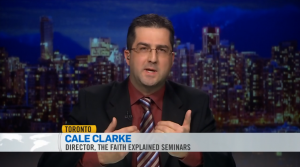 Hi Everybody, just a note to let you know you can watch the interview I had tonight with Scott Laurie of CTV News about all things papal online here!
Hi Everybody, just a note to let you know you can watch the interview I had tonight with Scott Laurie of CTV News about all things papal online here!
 Today’s first reading from 1 Corinthians 15 contains one of the first “creeds” of the early Church. As Saint Paul writes,
Today’s first reading from 1 Corinthians 15 contains one of the first “creeds” of the early Church. As Saint Paul writes,
“For I handed on to you as of first importance what I also received:
that Christ died for our sins
in accordance with the Scriptures;
that he was buried;
that he was raised on the third day
in accordance with the Scriptures;
that he appeared to Cephas, then to the Twelve.
After that, he appeared to more
than five hundred brothers at once,
most of whom are still living,
though some have fallen asleep.
After that he appeared to James,
then to all the Apostles.
Last of all, as to one born abnormally,
he appeared to me.”
– 1 Corinthians 15:3-8
In an interview with Lee Strobel for the book The Case for Christ, scholar Gary Habermas showed that Saint Paul is, in fact, quoting a very early creed of the Church. First, Paul uses the terms translated “received” and “handed on”, technical rabbinical language for the passing on of sacred tradition. The text is also in stylized format, using parallelism, presumably to aid memorization. The use of the Aramaic version of Peter’s name, “Cephas” is likely a sign of its primitive date. The creed also uses phrases that are uncommon in Paul’s writings: “the Twelve”; “he was raised”; “the third day”. Habermas noted that scholar “Ulrich Wilkens says that it ‘indubitably goes back to the oldest phase of all in the history of primitive Christianity'” (Strobel, The Case for Christ, p. 230).
Habermas, among others, would contend that this creed could have been composed within mere months after the resurrection of Jesus. He notes that no credible scholar disputes Pauline authorship of 1 Corinthians, which was likely written between 55-57 AD. But Paul says in 15:3 that he passed the creed on to the Corinthian Church at some point in the past, predating his visit there in 51 AD. That places the composition of the creed no later than within 20 years of the original Easter event.
But Habermas – and others – think the creed goes back even further: between 32-38 AD, when Paul received it, in all likelihood in Jerusalem. Three years after Paul’s conversion, he travelled to Jerusalem to interview the Apostles Peter and James (whose feast day we celebrate today). Habermas draws our attention to the fact that, when Paul described this trip in Galatians 1:18-19, he uses the Greek word historeo, which indicates a thorough investigation of the facts surrounding Jesus’ resurrection was being made. So, in all likelihood, this creed was delivered to Paul by the eyewitnesses of the resurrected Jesus, Peter and James.
Of course, the creed goes on to enumerate other Easter eyewitnesses, including an appearance of the Risen Christ to over 500 people at once – “most of whom are still living” at the time Paul wrote 1 Corinthians. Paul is virtually daring any skeptics to interview these people.
The 1 Corinthians creed authenticates the resurrection of Christ in many ways, not the least of which is this: its incredibly early, eyewitness testimony precludes any possibility of legendary accretion. The fact is, the resurrection is a fact.
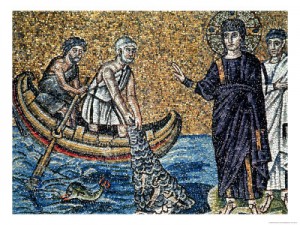 The old joke is still funny: Why did Peter deny Jesus? Peter was still mad that Jesus healed his mother-in-law. All kidding aside, many non-Catholics look at the indisputable fact that Peter had a mother-in-law (who was indeed healed by Jesus in Mark 1:30-31), and therefore must have had a wife, and consider the Catholic practice of clerical celibacy – well, a bad joke. They ask, “How can the Catholic Church require priestly celibacy when it’s clear that at least Peter – and possibly other Apostles – were married?”
The old joke is still funny: Why did Peter deny Jesus? Peter was still mad that Jesus healed his mother-in-law. All kidding aside, many non-Catholics look at the indisputable fact that Peter had a mother-in-law (who was indeed healed by Jesus in Mark 1:30-31), and therefore must have had a wife, and consider the Catholic practice of clerical celibacy – well, a bad joke. They ask, “How can the Catholic Church require priestly celibacy when it’s clear that at least Peter – and possibly other Apostles – were married?”
Today’s Gospel sheds light on both the Catholic practice in general, and Peter’s particulars. This is good evidence that Jesus himself required his apostles to share his way of life:
Peter began to say to Jesus,
‘We have given up everything and followed you.”
Jesus said, “Amen, I say to you,
there is no one who has given up house or brothers or sisters
or mother or father or children or lands
for my sake and for the sake of the Gospel
who will not receive a hundred times more now in this present age:
houses and brothers and sisters
and mothers and children and lands,
with persecutions, and eternal life in the age to come.
But many that are first will be last, and the last will be first.”
– Mark 10:28-31
The fact of the matter is that many clerics were ordained as married men in the early Church, but here’s the thing: they were required to be continent (abstain from marital relations) after ordination. There’s plenty of evidence that this practice dates to the Apostolic age and continued in both East and West. Strong documentation is found in Christian Cochini’s The Apostolic Origins of Priestly Celibacy, and Stefan Heid’s Celibacy in the Early Church, both published by Ignatius Press. Wives of potential clerics had to agree to such a change, or the ordination could not be carried out.
Peter, as Jesus indicated, left his wife and family home behind to follow Jesus more closely, as the Apostolic band roamed the countryside of Galilee. But this did not in any way indicate that he cruelly abandoned his bride, if she was indeed still living at the time. The extended family unit was paramount in Eastern cultures of the time, as it still is in many cases today. Many family members would often live under the same roof, and Mark notes that the healing of Peter’s mother-in-law occurred at Peter’s home in Capernaum. Peter’s wife would have been cared for. It is hardly imaginable that Jesus, who so despised divorce (which left women in a very precarious economic predicament in those days), would have advocated a cold dismissal of one’s spouse in order to be an Apostle.
Recently, the prominent canon lawyer Edward Peters has argued that the Church should return to her historical roots and that all clerics in higher orders, including permanent deacons (who currently are not required to do this), should observe the ancient practice of clerical continence. You can read his take here.

